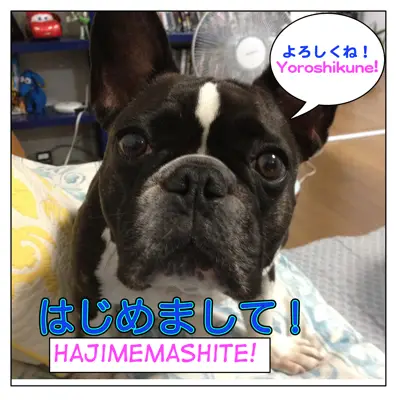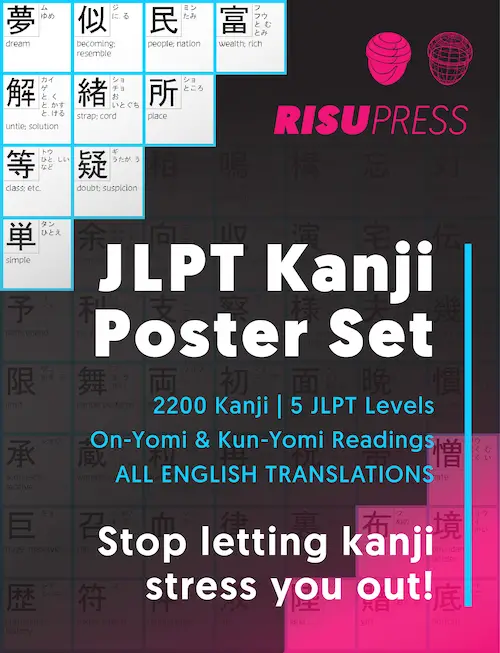はじめまして! よろしくね!!
= Hajime mashite! Yoroshikune!!
= (Nice to meet you! )
初めて誰かに会った時は、まず「はじめまして!」と言います。
= Hajimete dareka ni atta toki wa, mazu 「hajimemashite!」to iimasu.
= When we meet someone for the first time, we say “Hajimemashite!” )
まず、「はじめ」という漢字ですが、二つあります。
= Mazu, 「hajime」toiu kanji desu ga, futatsu arimasu.
= (There are two characters for Hajime)
「はじめまして」は、「初めまして」または「始めまして」と両方の書き方が認められています。
= “Hajimemashite” wa “「初めまして」mata wa 「始めまして」to ryouhou no kaikia ga mitomerareteimasu.
= To say “Hajimemashite” you can use either 初 or 始 .)
1)初め 音読み : しょ
= haji me onyomi : sho
(on-yomi = on reading)
* They are two types of reading kanjis. On-reading is one of them. The other one is kun yomi (= kun reading )->Usually kun reading composed with Hiragana.)
2)始め 音読み :シ
haji me onyomi :shi
全くはじめての時、初めての経験の際は「初」を使います。
= Mataku hajimete no toki, hajimete no keiken no sai wa「初」wo tsukaimasu.
= When you start something for the first time, you use “初”
1)「初」を使う例
「初」wo tsukau rei
(examples of using 初)
*あなたに初めて会ったのは去年の4月でしたね。
= Anata ni hajimete atta no wa kyonen no shi gatu deshita ne.
= It was last April when we first met.
*初めて人を好きになりました。
= Hajimete hito wo suki ni narimashita.
= I fell in love with someone for the first time.
2)「始」を使う例
「始」wo tsukau rei
(examples of using “始”)
*レッスンは5時から始まります。
= Lesson wa 5 ji kara hajimarimasu.
= The lesson will start from 5:00.
*ヨガを始めてから健康になった。
= Yoga wo hajimete kara kenkou ni natta.
= Since I’ve started Yoga, I feel healthier.
「よろしくね!」は友達同士の間柄で言います。最後に「ね」を使うのは女性言葉です。男性は「よろしく!」と言います。
= “Yoroshikune!” wa tomodachi doushi no aidagara de iimasu. saigo ni “ne” wo tsukau nowa jyosei kotoba desu. dansei wa “Yoroshiku!” to iimasu.
= “Yoroshikune” is used among friends. They put “ne” in the end if they are women. If you are a man, just say “Yoroshiku!” )
もう少し、フォーマルになると「宜しくお願いします。」と言います。 こちらは男女両方使えます。
= Mousukoshi formal ni naruto “Yoroshiku onegai shimasu.” to iimasu. Kochira wa danjyo ryouhou tsukaemasu.
= “Yoroshiku onegai shimasu” is more formal. This expression can be used by both men and women.
「宜しく(お願いします)」は、日本的な表現で他の言語に訳しにくいのですが、
= “Yoroshiku (onegai shimasu)” wa nihongo tekina hyougen de hoka no gengo ni yakushinikui no desuga,
= (Yoroshikune! is one of the typical」 Japanese expressions and hard to translate in other languages but ,)
何かを始める時、お世話になる人への丁寧な挨拶です。
= Nanika wo hajimeru toki, osewani naru hito yeno teinei na aisatsu desu.
= You say this phrase when you start something to people who suppose to take care of you. Like “Thank you in advance.”
それでは、これからもがんばってね!
= Soredewa, korekaramo ganbattene!
= がんばる:これも日本語的な表現ですね。
= Ganbaru : Kore mo nihongo tekina hyougen desune.
= Ganbaru is also very Japanese expression.
ここでは “Good Luck!”とか “Do your best!” 、”Hang in there!”というところでしょうか?
= Kore dewa “Good Luck” toka “Do your best!”, “Hang in there!” toiu tokoro deshouka?
= In this case, it means, “Good luck” ,”Do your best!” or “Hang in there!”
マギー先生もこれからがんばりますので応援してね!
= Maggie sensei mo korekara ganbari masu node ouen shitene.
= Maggie will do her best from now so please support her!
***
***
I REALLY appreciate your support! サポートありがとう! !CHECKHEART!
My supporters can access audio files for many lessons on my Patreon page and lots of mini lessons and quiz.
Also just added two new tiers.
ありがとう x 2: Mini lessons, Audio files for all the lessons here from 2018,
ありがとう x 5 Daily Japanese
ありがとう x 10 PDF file of all my twitter lessons for a month with an audio file.
Please check the details on my Patreon page.
:u: :u:



25 Comments
こんにちはマギー先生!!I am a new member〜
Can you tell me how to read the lessons in order? Should I study according to the date of lessons?
Sorry, my English is not good…
And thank you ^^
こんにちは、奈々生
Welcome to my site.
There is no right order to study this site. I believe all my readers have different levels and interests. I have been trying to cover lots of information in one lesson targeting all different levels.
One lesson is pretty long so you can get the information you like and move on to the different lesson.
You can use the JLPT level tag if you are focusing on grammar.
Oh no…
I just realized my main lesson index has been inactivated. I fixed it now so you can go through the list.
Main Lesson Index
Hello there, Maggie-sensei!
I’m learning Japanese, as most of your readers do, I suppose ))
I have a question. I’ve read that with such words as 好き 嫌い 上手 下手 が must be used. But in your example you use を 「初めて人を好きになりました。」
Is it also OK to use を in such cases?
@Eugene
Hi Eugene,
Yes,好き、嫌い、上手、下手 are adjectives so you say ~が(or は)好き、嫌い、上手、下手
But when it is use with になる (verb) you can both use が好きになる・を好きになる・が嫌いになる・を嫌いになる、
(As for 上手 and 下手, が上手になる、が下手になる)
Also when you modify a noun you can use を as well.
彼女を好きな人
彼女が好きな人
にんじんが嫌いな人
にんじんを嫌いな人
When it is modify a verb (to use 上手 and 下手 as adverbs) you use を
漢字を上手に書く
絵を下手に描く
Hello! This isn’t the right spot to post this, but I couldn’t find a post for it, so I’ll just ask here if that’s okay. :)
I was just wondering if there are rules about when to use kun-yomi or on-yomi or if it’s okay to use either?
Like 剣: is it okay to use つるぎ or ケン interchangeably?
Thanks so much!! :D
@Jasmine
Hi Jasmine,
Unless it has furigana, we don’t know which one to use. That means technically you can read 剣 both けん and つるぎ
Maggie-sensei, may I know why did you use 「ところ」in ここでは “Good Luck!”とか “Do your best!” or “Hang in there!”ってところでしょうか?
@changkh
Hello changkh
Oh this is my very first lesson.
You can replace ってところでしょうか with ということです。(=That means)
You use という(っていう)ところでしょうか when you rephrase something.
@Maggie-sensei
Thank you for your quick reply. I knew about your blog some time back but never had time to read through. So I have decided to start reading every lesson from day 1.
I see. This is something new. I always thought ところ is only used to refer to place or location, both physical and abstract.
これから、よろしくお願いします。
@changkh
こちらこそよろしくお願いします。
All the lessons are very random so I would say go to the Index and start with any lesson you are interested in.
hai~ i hope i can fully learn Nihongo.
oh… ah it’s okay i’ll start from here. And I Want To see all your lessons ^_^
@Ai
Great!! Gambattene!!! :)
Hi Maggie Sensei
i really like the way you explain everything. I’m just a beginner in learning japanese. I’m a nihonjin but raised in other country so i need to study japanese in order for me to understand of what japanese people are saying. so When i go back there i don’t need to worry about understanding them. n_n)
so i’ll proceed to the next lesson~
@Ai
はじめまして、Ai!
Welcome to Maggie Sensei’s site. So you are Japanese learning 日本語. Feel free to ask any questions. There is no right order to start this site. Just go to the Index and pick a lesson. Hope you learn a lot!
if i start from here i can cover all the lessons right?by clicking “next lesson” i mean,i dont mind if it skips any of the beginners lessons as i already know a bit of the language, i just want to make sure ill cover all the categories (on top of the page)doing this?
@白虎君
There is no rule where to start but yes, if you keep studying from this lesson, eventually it will cover the whole lessons.
But I would pick the lessons you are interested in from Index.
i see thanks a lot, this site is really good by the way, there are a lot of things the previous site i had been studying from did not have ^_^
@白虎君
どういたしまして!Hope you enjoy studying Japanese here. :)
Hi Maggie Sensei!
I love this site ;) Really love how You can explain grammar problems so easily ;) Thx for incredible source! I hope I’ll post next comment in Japanese :)
ありがとうございます!
@Syriusz15
はじめまして!!Thank you for your nice comment! Hope you come back here again and again!
Feel free to ask a question or leave a comment anytime. I will always help you here.
This site is wonderful. Thank you for such an incredible resource. I just finished studying Tae Kim’s website, and I was looking for a good site to transition to. I feel your blog will take me a long way. Much appreciation!
@Jessie
Hi Jessie! Welcome to Maggie Sensei’s site!
これから、よろしくね! !happyface!
はじめまして。
Now I know when to use 「初」 and 「始」.
Thanks for the lesson.
宜しくね ^^,
Great lesson.
どうぞ宜しく。
おねがいします。
@jayefes65
はじめまして!!
こちらこそ宜しくお願いします。
また来て下さいね。